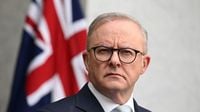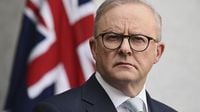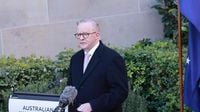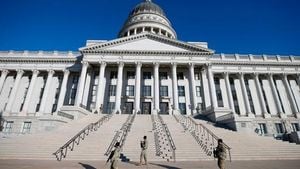Australia has taken the extraordinary step of expelling Iran’s ambassador and suspending its diplomatic presence in Tehran after intelligence authorities concluded that Iran’s Islamic Revolutionary Guard Corps (IRGC) orchestrated two antisemitic arson attacks on Australian soil last year. The move, announced on August 26, 2025, by Prime Minister Anthony Albanese in Canberra, marks the first time since World War II that Australia has expelled a foreign ambassador, a measure underscoring the gravity of the allegations and the diplomatic rift now unfolding between Canberra and Tehran.
The two attacks in question targeted Jewish sites: Lewis’ Continental Kitchen, a kosher restaurant near Bondi Beach in Sydney, was set ablaze on October 20, 2024, while the Adass Israel Synagogue in Melbourne was firebombed on December 6, 2024. Fortunately, no injuries were reported, but the incidents caused significant property damage and stoked fear within Australia’s Jewish community. According to the Australian Broadcasting Corporation and other major outlets, the Adass Israel Synagogue—built by Holocaust survivors in the 1960s—was occupied at the time, forcing worshippers to flee for their safety as flames spread through the sanctuary.
At a press conference, Prime Minister Albanese described the attacks as “extraordinary and dangerous acts of aggression orchestrated by a foreign nation on Australian soil.” He emphasized, “They were attempts to undermine social cohesion and sow discord in our community. It is totally unacceptable, and the Australian government is taking strong and decisive action in response.” Albanese further noted that intelligence suggested Iran was likely behind additional, as-yet-unconfirmed attacks on Jewish interests in Australia.
Australia’s domestic spy agency, the Australian Security Intelligence Organisation (ASIO), led a months-long investigation that uncovered what Director-General Mike Burgess called a “layer cake” of intermediaries. According to Burgess, “Our painstaking investigation uncovered and unpicked the links between the alleged crimes and the commanders in Iran’s Revolutionary Guard Corps, the IRGC. The IRGC used a complex web of proxies to hide its involvement.” He elaborated that these proxies included criminals and members of organized crime gangs, acting as cut-outs to distance the Iranian regime from direct responsibility.
Despite the severity of the findings, ASIO made clear that Iranian diplomatic staff in Australia were not personally involved in directing the attacks. “ASIO now assesses the Iranian Government directed at least two and likely more attacks on Jewish interests in Australia,” Burgess stated, but clarified that “no Iranian diplomats or embassy staff in Australia were involved in the attacks.”
Foreign Minister Penny Wong, who stood alongside Albanese at the announcement, called the acts “completely unacceptable” and confirmed that Iran’s ambassador to Australia, Ahmad Sadeghi, and three other diplomatic staff were given seven days to leave the country. “This is the first time in the post-war period that Australia has expelled an ambassador,” Wong said, adding that the decision was made with the utmost seriousness. Australia has also suspended operations at its embassy in Tehran for the safety of its consular officials, and Wong urged Australians in Iran to leave immediately if safe to do so. “Our message is, if you are an Australian in Iran, leave now if it is safe to do so,” she said.
The Iranian government has forcefully rejected the accusations. Esmail Baghaei, spokesperson for Iran’s Foreign Ministry, dismissed the expulsion as “tied to Australia’s internal affairs” and insisted, “antisemitism has no place in our culture, history or religion.” Iranian media, including the state-affiliated Fars news agency, labeled the claims “unfounded,” while the semi-official Tasnim news agency described the expulsion as occurring under “false pretenses.” As of publication, Iranian officials had not issued a detailed formal response to Canberra’s actions.
Australia’s response goes beyond diplomatic expulsions. Prime Minister Albanese announced that the government will legislate to list the IRGC as a terrorist organization—a move that would bring Australia in line with the United States, which designated the IRGC as a terrorist group in 2019. “I’ve said many times that the Australian people want two things: They want killing in the Middle East to stop, and they don’t want conflict in the Middle East brought here. Iran has sought to do just that,” Albanese said. “They have sought to harm and terrify Jewish Australians and to sow hatred and division in our community.”
The Israeli Embassy in Canberra welcomed Australia’s actions, stating, “Iran’s regime is not only a threat to Jews or Israel, it endangers the entire free world, including Australia.” Israel’s government, which fought a 12-day war with Iran in June, has long warned of Iranian attempts to project power and foment instability abroad through groups like the IRGC.
Australia’s intelligence services have noted a marked increase in antisemitic attacks since October 7, 2023, the day of Hamas’s cross-border assault on Israel. That attack, which killed around 1,200 people and saw 251 others abducted, triggered a war in Gaza that has left more than 62,000 dead, according to the local health ministry figures cited by the United Nations. The violence has reverberated globally, with Australia seeing a surge in attacks on Jewish schools, homes, vehicles, and synagogues. Civil society groups have also reported a rise in Islamophobic incidents during the same period, underscoring the broader social tensions at play.
Australian authorities stress that not all antisemitic incidents are connected to Iran. “ASIO is still investigating possible Iranian involvement in a number of other attacks. But I want to stress, we do not believe the regime is responsible for every act of antisemitism in Australia,” Burgess said. Nonetheless, the government’s findings have sent shockwaves through Australia’s Jewish community and prompted widespread calls for increased security at religious and cultural sites.
Counter-terrorism investigators in Victoria have made arrests in connection with the Melbourne synagogue arson, with charges laid against two men and a third suspect still under investigation. The attacks have been condemned across Australia’s political spectrum, with Home Affairs Minister Tony Burke calling Iran’s actions an “extraordinary attack” that reached a “new and totally unacceptable low.”
The diplomatic fallout comes at a time of heightened political tension between Australia and Israel as well. Albanese’s government has faced criticism from Israeli Prime Minister Benjamin Netanyahu, who accused the Australian leader of “betraying Israel” after Australia announced it would recognize a Palestinian state. Albanese, for his part, has dismissed Netanyahu’s remarks, saying he doesn’t “take these things personally.”
As the dust settles, Australia’s decisive response to foreign-directed attacks on its soil sends a clear message about the nation’s intolerance for external interference—especially when it comes to the safety and cohesion of its diverse communities. With the IRGC soon to be formally listed as a terrorist organization and diplomatic relations with Iran at their lowest point in decades, the Albanese government has signaled its willingness to act forcefully in defense of Australian sovereignty and social harmony.






